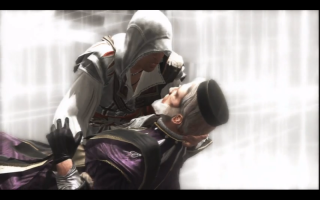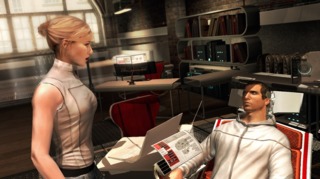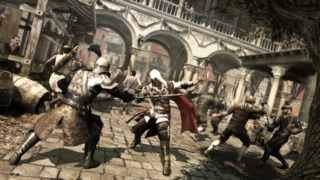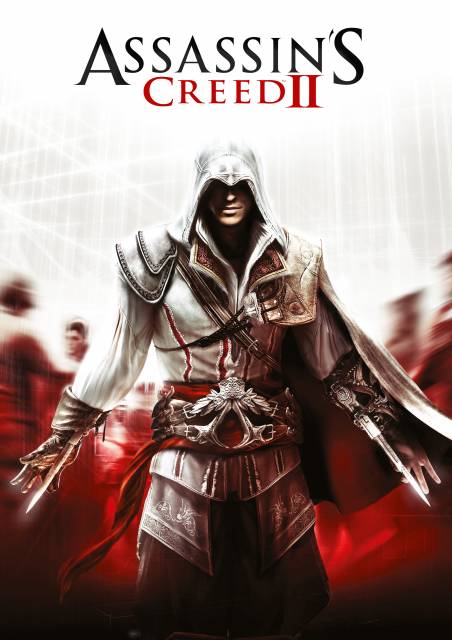Assassin's Creed II is the perfect sequel embodied
You may remember the first Assassin's Creed as a game with some really cool ideas and great graphics, that was brought down by some significant flaws, like the fact that the entire game basically consisted of the same 5 mission types over and over again. I personally loved the previous game, being able to look past these shortcomings, but a lot of people did not. Thankfully, Assassin's Creed II intelligently builds on what made Assassin's Creed great, and throws in a lot more content and mission variety. Thanks to this wise approach, Ubisoft has crafted a sublime game that, if you were in any way interested in the first game, you are sure to enjoy. It is just plain better in every way.

Assassin's Creed II picks up moments after the rather open ending the previous game concluded with. Desmond is still wondering what the hell happened, when Lucy comes and drags him out of Abstergo, beating up some guards along the way. After the rather exciting escape, Lucy informs Desmond that they must initiate his training to become an assassin himself. And thankfully, some sort of process in the brain allows him to do so in a matter of days, by diving into his genetic memories and copy moves and routines from his ancestors.
It's an excellent excuse to jack back in, but this time around, you won't be taking control of the bad-ass slayer of crusaders, Altaïr. Instead, Ezio Auditore da Firenze is your man. You actually meet him as he is being born, and from there, a long prologue about his adolescence rolls out. Ezio is young and care-free, tempting girls, rolling in his father's money and brawling with the opposing families of power in Fiorentina. However, after an hour or so, lightning strikes, and all of a sudden, his life gets turned upside down. From there on, Ezio aims to punish those who have wronged him and his family, and his desire for vengeance is totally justified.
However, when you think about it, Assassin's Creed is about Desmond. Unlike the first game, where Vidic will pull you out of the Animus after just about every mission, in Assassin's Creed II, you only get to see the control room very sporadically. I counted three times where you took control of Desmond. I thought that was kind of too bad, because, while Ezio's resolve was something I could relate to, I was way more interested in the real-world antics of Lucy and Desmond. It was hard to shake the feeling that what Ezio is doing isn't of great consequence, and he even states this himself. Right at the end of the game, a single event blows the lid off and completely reveals what's going on to Ezio in one fell swoop. Though the missions are much more varied this time around, the game quickly falls into the same pattern of “acquire intel regarding target, and then take him out.” Young Auditore kills quite a few Templars over the course of the game, but only the very last kill actually seems to do something. That was a bit disappointing to me. However, this flaw in story development is made up by the fact that the ending is mindblowing. Marvellous. Fantastico! The game's conclusion sketches some very exciting prospects for the inevitable sequel, and makes the whole ride worth it.

Assassin's Creed II improves and expands on the first Assassin's Creed's gameplay in every conceivable way. Altaïr was pretty good at his job, but Ezio is just better in every way. The free-running has been streamlined, to enable Ezio to scale buildings even faster and make Altaïr look like an old man. The combat has also been expanded, with lots of weapons to buy and pick up, armor to buy, moves to learn, smoke bombs and more. Some new enemy types have been added, although they don't change the feel of the combat all that much. You can, unfortunately, still be surrounded by enemies and simply stand still, countering and killing them as they take turns attacking. The window for countering is absolutely humongous, so this tactic is almost too easy to apply. Still, the combat manages to look good at all times.
The “Social Stealth” has also been improved upon. Previously, hiding in plain view meant that you had to walk along with some priests. Somehow, the guards would not notice that you were the only priest armed to the teeth with swords and knives. In the new game, however, any group of two or more NPCs can be used for Social Stealth. It's not necessarily more realistic when guards do not notice you as you are walking along with two prostitutes, but it is quite cool when you are just running along with a huge crowd and you can laugh at the ignorant guards.
Like I said before, the core pattern of “kill, kill, kill” is still here, but this time around, there's some stuff to get side-tracked by. There are plenty of side-missions, like races, delivery missions and other random errands. I didn't really get into them too much, but it's nice that they're there. Ezio is a rich man, and he is the landlord of Monteriggioni. The town villa is in pretty bad shape, so you can busy yourself with spending money upgrading the place and making the village more profitable. You've also got the horrible collection quest for feathers, this edition's equivalent of flags.

One significant extra is the Assassin's Tombs you can explore. Imagine playing Prince of Persia with Assassin's Creed's platforming mechanics. If you do that, then you'll have a pretty good idea of what these tombs are like. In order to find the reward that lies at their end, you must jump from pole to pole, climb walls and look around in first-person to see where you're going. It's awesome. I'm not sure if this is a testament to my love of Prince of Persia or a negative for Assassin's Creed II, but some of the most fun I've had in this game was solving the platforming puzzles under those churches. It shows just how much the free-running, although automated, is capable of.
Another distraction are the symbols you can find on certain prolific buildings that you can find. They present you with a puzzle, and if you solve that puzzle, a piece of video will be unlocked. Unlock all twenty pieces and you will witness something that is mind-boggling, much in the same way as the game's actual ending.
If there are two words that permeate Assassin's Creed II, they are most definitely “Italia” and “Renaissance”. I have a distinct love for both subjects, so this game hit my weak spot. As Ezio, you will be running across the beautiful vistas of Firenze, Venezia and a couple of other less prolific, but just as fantastic villages. The game boasts lots of historical facts, and throws them in your face in rapid succession. Run past a church? Update! Meet someone, like, I don't know, Leonardo Da Vinci? Update! Get a new target! Update! You'll build an entire databank of information, and although Assassin's Creed II is obviously nowhere near historically correct, there is still of trivia to shove into your brain here. Some of my favourite churches have been accurately represented here, and I found myself actually stopping and looking at the recreated artwork on their walls. I love Italy, I adore Italian. I was pleasantly surprised, therefore, to hear a good amount of Italian sprinkled throughout the conversations. If you are looking to learn some Italian nouns, you might learn something here. There is an option to set the game to being entirely Italian, which I promptly tried, hoping that the spoken Italian would only apply to the memories. Somewhat disappointingly, however, Desmond also started speaking Italian (and who would want to remove Nolan North from his game?) and the lip-syncing was off for obvious reasons. So, I begrudgingly flipped the switch back to full English, alas.

Assassin's Creed II looks extremely good, much like its predecessor did before it. The draw distance is fantastic, the buildings really get the look of the Italian città down, and the animations look superb. All that splendor does come at a small price: even when installed onto my harddrive, I saw a lot of textures loading in too late, and materializing as I was running past them. However, it is a minor issue that I could usually ignore pretty easily. The music and voice-acting are good, and the database menus and such excellent. The second Assassin's Creed does not disappoint when it comes to presentation.
Assassin's Creed II is just a fantastic game. The feel of the first is still very much in here, so if you disliked how that game played, you may not be swayed here. However, a lot more content, more evolved gameplay mechanics and a story that begs for more make this a game that you really ought to play, and one of 2009's best.

0 Comments